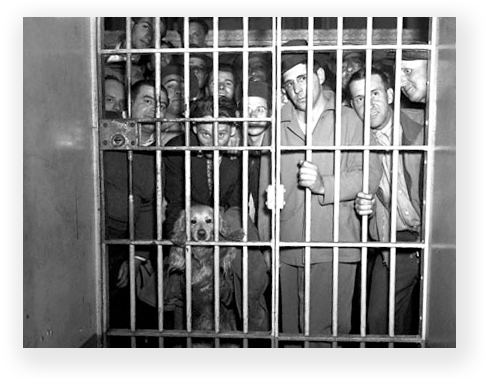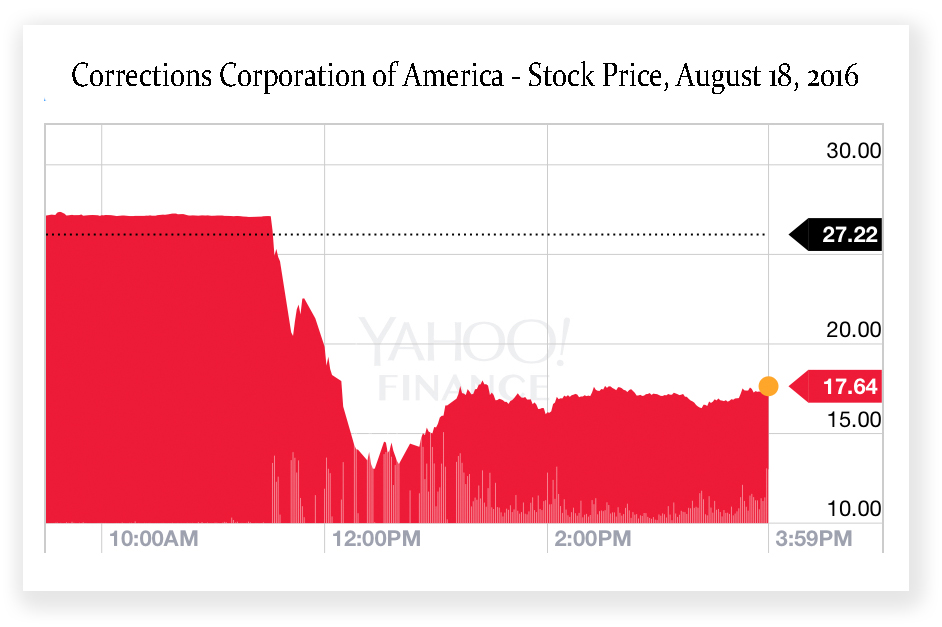We’re still doing a weekly newsletter … we’re just posting pieces of it every day. The news is fresher this way …
DOJ TELLS BOP TO END PRIVATE PRISON CONTRACTS
 Bad news came out of Washington, D.C., for all of those people who believe that a third inmate sleeping on the floor in a two-man cell, a nonstop diet of rice and beans, and understaffed health services constitute reasonable and effective corrections policy: the Dept. of Justice directed the BOP to phase out all private prison contracts over the next five years.
Bad news came out of Washington, D.C., for all of those people who believe that a third inmate sleeping on the floor in a two-man cell, a nonstop diet of rice and beans, and understaffed health services constitute reasonable and effective corrections policy: the Dept. of Justice directed the BOP to phase out all private prison contracts over the next five years.
In a memo to the Director of the BOP, Deputy Attorney General Sally Q. Yates wrote “I am directing that, as each contract reaches the end of its term, the Bureau should either decline to renew that contract or substantially reduce its scope in a manner consistent with law and the overall decline of the Bureau’s inmate population.”
Yates’ action comes on the heels of a DOJ Inspector General’s report issued last week, which looked at 14 contract prisons used by the BOP, and found that in a “majority of the categories… contract prisons incurred more safety and security incidents per capita than comparable BOP institutions… From FYs 2011 through 2014 in eight key categories: (1) contraband, (2) reports of incidents, (3) lockdowns, (4) inmate discipline, (5) telephone monitoring, sexual misconduct, the contract prisons had more incidents per capita than the BOP institutions… For example, the contract prisons confiscated eight times as many contraband cell phones annually on average as the BOP institutions. Contract prisons also had higher rates of assaults, both by inmates on other inmates and by inmates on staff.”
The inspector general’s report concluded that private prisons are dramatically less safe, less secure, and more costly than the BOP’s own prisons. The private facilities, Yates wrote in yesterday’s memo, “simply do not provide the same level of correctional services, programs, and resources” and “do not save substantially on costs.”
As of December 2015, contract prisons housed roughly 22,660 federal inmates, or about 12 percent of the BOP’s inmate population. Yates’ directive means that by next May, when many of the current federal contracts end, the number of BOP inmates in private prisons will drop to 14,200, down from a high of nearly 30,000 in 2013. Within five years, every current BOP contract with a private prison will have ended.
The DOJ move will undoubtedly come as a disappointment to Donald Trump. When asked recently how he planned to reform the country’s prison system, Trump said, ““I do think we can do a lot of privatizations, and private prisons it seems to work a lot better.”

Publicly traded prison stocks The GEO Group Inc. (NYSE:GEO) and Corrections Corporation of America (NYSE:CXW) were off around 40% yesterday afternoon after the DOJ announcement. GEO and CXW shares have climbed 65% and 40%, respectively, in the past several years, but they gave up much of that gain in the wake of the DOJ announcement.
Private prisons like GEO Group and CCA have long been criticized for inefficiency, deplorable conditions and, and in some cases, corruption. For example, a University of Wisconsin study examined Mississippi data showing state prison terms were being manipulated to bolster private prisons’ profits. Prisoners suffered longer sentences than their publicly imprisoned peers, and were more likely to return to jail. Other critics have accused private prisons of fostering higher recidivism rates. In fact, in the past, CCA has touted ‘high recidivism’ as a reason private prisons are a ‘unique investment opportunity.’”
The DOJ decision does not necessarily affect Geo Group’s and CCA’s state business, but the states (which account for about half of all private prison business) could follow the DOJ’s lead, especially if they fear that the DOJ report could provide a basis for prisoner lawsuits against them arising from private prisons’ failings. Likewise, the new DOJ policy does not affect private prison contracts with Immigration and Customs Enforcement to run immigrant detention centers or with the U.S. Marshals Service to jail detainees for short periods of time.
The BOP recently declined to renew a contract for approximately 1,200 beds. Yesterday, the BOP amended a current contract solicitation to reduce an upcoming solicitation from a max of 10,800 beds to a max of 3,600. Yesterday’s BOP memo asserted that “taken together, these actions will allow the Bureau to end the housing of inmates at three or more private contract facilities over the next year, and will reduce the total private prison population to less than 14,200 inmates by May 1, 2017 – a greater than 50 percent decrease since 2013.”

